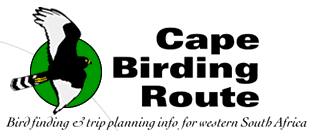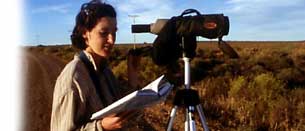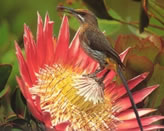|
|
Introduction:
The
Hottentots Holland mountains border the western Overberg and
are traversed, via Sir Lowry’s Pass, by the N2 national
road. The pass is legendary in birding circles for the numerous
fynbos specials that are easily accessible just a short walk
from the highway. The site is close to Cape Town and can easily
be tackled in a morning out of the city. Just to the south
is a spectacular coastal drive winding along the eastern coast
of False Bay and through the coastal villages of Rooi Els
and Betty’s Bay, where further fynbos and coastal specials
are on offer.
Although
all the sites described in this chapter are manageable in
a long day trip out of Cape Town, a more extensive two- to
three-day loop would be more relaxing and productive for those
with the time to spare. A good three-day loop might begin
at Sir Lowry’s Pass before continuing east, along the
N2, to the town of Swellendam, at the foot of the Langeberg
mountain range. From here, you can make an eastwards loop
to Grootvadersbosch, the Langeberg’s largest afromontane
forest, for the best diversity of forest birds reasonably
close to Cape Town. Returning to Swellendam, where a good
variety of accommodation is available, you can strike south
through the wheatlands in search of the localized and recently
split Agulhas
Long-billed Lark (see p.73). The agricultural lands
also offer numerous other sought-after species, which are
surprisingly accessible in this highly transformed landscape.
Nearing the coast of the Indian Ocean, one can enjoy some
excellent birding at Potberg mountain in the De Hoop Nature
Reserve, before perhaps continuing southwestwards to De Mond,
just east of the rather anticlimactic southernmost point of
the African continent, at Cape Agulhas. De Mond is noted for
its breeding colony of Damara
Tern (p.68), a highly threatened, diminutive and attractive
species endemic to the South African and Namibian coasts.
Returning
towards Cape Town, you might consider visiting Cape Agulhas
and, further west, the resort town and harbour of Hermanus.
This is one of the most famous whale-watching localities on
earth and home to the world’s only whale-crier, who wields
a kelp-horn to inform one of the whales’ appearances.
Southern Right Whales (Eubalaena australis) are the
most common species, and from July to November you can be
sure to see impressive numbers especially close inshore. On
your way back to Cape Town, you may wish to visit Betty’s
Bay and Harold Porter before setting off on the scenic drive
that twists along the coast to rejoin the N2 national road
at Somerset West.
|
This website is maintained by Birding Africa.
Please do not use any text, images or content from this site without
permission.
© Birding Africa 1997-2009 info@capebirdingroute.org
4 Crassula Way, Pinelands, 7405, Cape Town, South Africa
|

27/09/09: Dalton
Gibbs reports back from Gough
Island! Read the blog!
26/09/09: New Cape
Town Pelagics trip report from trips of 12 and 19 September
2009.
30/08/09: British
Birdwatching Fair at Rutland Water proved very successful,
with sunny weather and over 20,000 visitors. Callan's "Birding
Namibia and the Okavango" was the most highly-attended
lecture on the Saturday, with over 240 people. Congratulations
to the winners of the Birding Africa competition and the
African Bird Club raffle that we helped sponsor!
12/08/09: New Cape
Town Pelagics trip reports from August and July 2009.
Highlights: Little
Shearwater and more!
07/08/09: The
sub-adult Black Sarrowhawk visits our garden again! Read
on about Raptor Research in the Western Cape.
27/07/09: Cape
Town's Verreauxs' Eagle Chick has grown! And its sibling
never had a chance to hatch. See the pictures of the chick,
its nest and the breeding pair. Find out more about the Western
Cape Raptor Research Programme.
27/07/09: To follow modern nomenclature and systematics, we've
adopted the IOC
World Bird List, Version 2.1.
13/07/09: The 8th
African Bird ID Challenge has launched! Win a 50% discount
on a Cape Town Pelagics
trip, a copy of Southern
African Birdfinder, or African
Bird Club membership for 1 year.
6 July 09: Cape
White-eye research in our garden.
2 July 09: Cape
Town's Verreauxs' Eagle Chick has hatched! See the pictures
of the chick, its nest and the breeding pair. Find out more
about the Western Cape Raptor Research Programme.
2 July 09: Campbell
Fleming, a Cape Town scholar, avid birder and photographer,
joined Birding Africa last month as an intern. Click here,
to see what he got up to.
2 July 09: New pelagic
trip reports from the Cape Town Pelagics trips in June
2009. Highlights: Slenderbilled
Prion and Leach's Storm Petrel
30 july 09: Our latest Cape Fynbos and Karoo trip
reports feature Hottentot
Buttonquail, Cinnamon-breasted
Warbler and other fynbos and Karoo endemics...
26 June 09: Tungsten
mining threatens RAMSAR site, South Africa's Verlorenvlei.
Read the Media Release.
22 June 09: Claire
Spottiswoode, one of the Cape Birding Route founders,
was part of the exploratory team at Mount Mabu. The mountain
is part of the newly discovered largest
rainforest in Southern Africa.
11 June 09: A colour-ringed
Black Sparrowhawk visits the Birding Africa office garden.
Read why it's a 10 months old male!
14 June 09:
Wildlife
at the office of The Cape Birding Route, Birding Africa
and Cape Town Pelagics.
31 May 09:
Michel Watelet wins the 7th African Bird Club & Birding Africa
ID Challenge. Test your African birding skills and WIN
a Birding
Africa Cape town day trip or a copy of the Birdfinder!
30 May 09:
A tragedy unfolds at Kommetjie south of Cape town as 44 beached
False
Killer Whales were shot. Click here for more details and
pictures.
14 March 09: Raptor
Watch in Cape Town on 14 March 09
|
|


